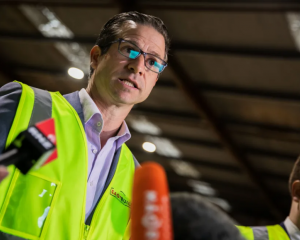The GCSB acting chief, Una Jagose, said the answer to the real tension between her bureau's need for secrecy and the public's demand for greater transparency lay the independent oversight of the agency, New Zealand's foreign intelligence agency.
The post of Inspector General of Intelligence and Security is held by Cheryl Gwyn, a former deputy Solicitor-General.
"She is entitled to and does, come into the bureau at any time and she can look at anything she likes. She can question any of us under oath. She can ask for any document or explanation."
The job used to be a part-time job held by a retired judge.
It is now full-time, with a full-time deputy and five investigators.
Una Jaose, who was also deputy Solicitor-General before stepping into to Ian Fletcher's role last week, was appearing before the Intelligence and Security Committee at Parliament ostensibly to discuss the annual report of the Government Communications Security Bureau, alongside Rebecca Kitteridge, who is director of the Security Intelligence Service.
Prime Minister John Key chaired the committee, which comprises the Minister Responsible for the GCSB and SIS Chris Finlayson, Justice Minister Amy Adams, Opposition leader Andrew Little and Labour foreign affairs spokesman David Shearer.
She began her relieving role last week, the same week that documents taken from the NSA by Edward Snowden relating to New Zealand were published by the Herald.
She said the media attention had raised "a real important tension."
"We all know it. It is New Zealanders' call for openness and it is the bureau's need for secrecy around a lot of what it does."
The tension would be resolved by understanding some fundamental issues.
"In our business transparency and openness is not an easy matter. We have to make sure we do not inadvertently increase our vulnerability to people who don't have New Zealand's best interests at heart whether that is by revealing courses, methods we use or the targets we have.
"Actually we don't want the people we are conducting foreign intelligence on or defending computer networks from to know we are looking at them or how we are doing that.
"And actually we don't even want them to know what we are not capable of because that also gives insights into vulnerabilities."
If the agency was more open with New Zealanders about what it did and did not do, people who did not have New Zealand's interests at heart would have an advantage to act against New Zealand's interests and give them an insight into its vulnerabilities.
"That would make the job of the Government, the bureau, the service a lot harder and possibly impossible."
Mr Little asked Ms Jagose several questions about the material released by Snowden such as the reference to "full-take" collection of information in the Pacific.
She said he would be better to ask the question in the closed session with committee members only which followed the public session.
By Audrey Young of the New Zealand Herald












